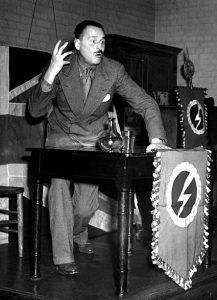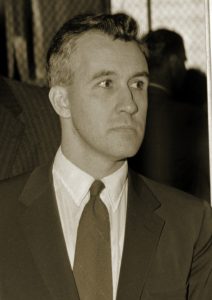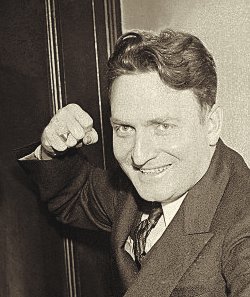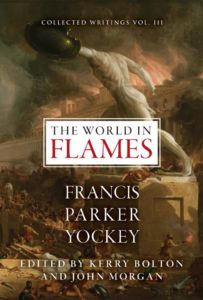 1,250 words
1,250 words
Francis Parker Yockey
The World in Flames: The Shorter Writings of Francis Parker Yockey
Ed. Kerry Bolton and John Morgan
Centennial Edition Publishing, 2020
Limited hardcover edition: 512 pages
Paperback edition: 506 pages
There are three formats for The World in Flames:
- Hardcover, limited edition of 200 numbered copies: $50 (add $5 for US postage, $25 for postage to the rest of the world). Release date: June 2020
- Paperback: $30 (add $5 for postage, $13 for postage to Canada, Australia, New Zealand, & the Far East). Release date: May 13, 2020.
- E-book: $15. Release date: May 16, 2020.
Note: The limited-edition hardcover has a third appendix of six pages with seven photographs of Francis Parker Yockey, six of them never before published.
Note: If you wish to collect all three volumes in the limited edition, and ensure that they all bear the same number, you can order the whole set in advance. The cost of the three-volume set, including postage:
- US customers: $170
- The rest of the world: $250 (sorry, but it will be very expensive to ship the hardcover of Imperium outside the United States)
How to Order:
There are three ways you can send payment:
- By credit card or bank transfer
- By mail
- By crypto-currency transfer
To use a credit card or bank transfer email [email protected]
Steps for mailing in your payment:
- Download and print our order form (PDF, Word)
- If you wish to order multiple books, please email a list of the titles you wish to order and your mailing address to [email protected], and we will give you an exact quote on postage anywhere in the world.
- Send payment to the address on the order form.
- Please allow up to four weeks for delivery.
Steps for paying with crypto-currencies:
- Determine which books you wish to order, and how many.
- If you wish to order multiple books, please email a list of the titles you wish to order and your mailing address to [email protected], and we will give you an exact quote on postage anywhere in the world.
- Choose a crypto-currency option and send payment to one of our addresses here.
- Email the order and the crypto payment receipt (so we know what transfer is yours) to [email protected]
About The World in Flames:
The World in Flames collects all of Francis Parker Yockey’s surviving essays and correspondence, including recent and never-before-published archival discoveries. The volume is edited with an Introduction and annotations by Kerry Bolton, the foremost expert on Yockey’s life and thought. The World in Flames is an indispensable volume for understanding America’s most important anti-liberal thinker.
The World in Flames is the first published volume of the new three-volume Centennial Edition of Francis Parker Yockey’s Writings. The General Editor of the edition is Greg Johnson.
Volume One:
Imperium
The Philosophy of History & Politics
Edited by Greg Johnson
(San Francisco: Counter-Currents, 2021)
Volume Two:
The Enemy of Europe
Edited and translated by Thomas Francis
(San Francisco: Counter-Currents, 2020)
Volume Three:
The World in Flames
The Shorter Writings of Francis Parker Yockey
Edited by Kerry Bolton & John Morgan
(San Francisco: Counter-Currents, 2020)
Each volume in the edition will be published in a limited hardcover edition of 200 numbered copies, as well as in paperback and electronic versions. As with our edition of Savitri Devi’s works, the hardcovers will be manufactured to the highest academic press standards.
Note: Because of the manufacturing time, the limited edition of The World in Flames will be available in June, 2020. Please bear in mind that Imperium will be released in 2021, and The Enemy of Europe will be released in the Summer of 2020.
CONTENTS
Introduction by Kerry Bolton — iii
Editorial Note by John Morgan — vii
1. Philosophy of Constitutional Law (1937) — 1
2. The Tragedy of Youth (1939) — 36
3. Life as an Art (1940) — 43
4. Twentieth-Century Metaphysics (ca. 1945–48) — 55
5. 1848–1948: Years of Decision (1948) — 61
6. Italo-English Convention (1949) — 65
7. The Proclamation of London of the European Liberation Front (1949) — 70
8. Correspondence with Adrien Arcand (1949–50) — 111
9. Varange Speaks! (1950) — 131
10. America’s Two Ways of Waging War (1950–51) — 140
11. Correspondence with Virginia Johnson (1950–52) — 145
12. Thoughts Personal & Superpersonal (ca. 1950) — 156
13. Miscellaneous Notes (ca. 1950–53) — 176
14. Thoughts Upon Waking (ca. 1950–53) — 181
15. Two Reflections (1950, 1953) — 189
16. The Death of England (1951) — 194
17. America’s Two Ways of Waging War (1951) — 198
18. America’s Two Political Factions (1952) — 218
19. Correspondence with Dean Acheson (1952) — 226
20. What is Behind the Hanging of the Eleven Jews in Prague? (1952) — 252
21. Letter to Wolfgang Sarg (1953) — 264
22. Brotherhood (1953) — 275
23. Culture (1953) — 296
24. Translator’s Preface to Der Feind Europas (1953) — 307
25. Oswald Spengler, the American Jewish Committee, & Russia (1954) — 312
26. The Destiny of America (1955) — 326
27. “Hang On & Pray”: Arnold Toynbee, Co-Existence Apostle (1956) — 340
28. A Warning to America: An Estimate of China, a Warning to the West (1959) — 365
29. The World in Flames (1960) — 397
30. The Suicide Note — 416
31. Fragments (1952–1960) — 420
APPENDICES
I. Frontfighter, issues 4, 7, 10, 11, 13, & 23 (1950–52) — 433
II. H. Keith Thompson, “In Memoriam—Francis P. Yockey” (1960) — 462
The limited-edition hardcover has a third appendix of six pages with seven photographs of Francis Parker Yockey, six of which have never been published.
ABOUT THE CONTRIBUTORS — 463
INDEX — 469
Francis Parker Yockey (1917–1960) was born in Chicago. After studying at the University of Michigan, Georgetown University, and the University of Arizona, he graduated cum laude from the University of Notre Dame Law School in 1941. In 1946, Yockey worked as an attorney for the Nuremberg Trials in Germany. In 1948, Yockey published Imperium: The Philosophy of History and Politics (2 vols.) under the pen name Ulick Varange. In 1949, Yockey published a manifesto, The Proclamation of London. In 1953, he published The Enemy of Europe. But Yockey was not just a political theorist. He was a political actor. For the remainder of his life, Yockey traveled the world, using a bewildering array of passports and fake identities, building a network of contacts with National Socialist exiles, Arab nationalists, Marxists, and Third World liberation movements. His ultimate aim was a unified Europe, free to pursue its destiny without the domination of outside powers. He committed suicide on June 16, 1960 in the San Francisco Jail, where he was being held on charges of passport fraud. Since his death, Yockey has been recognized as America’s foremost anti-liberal thinker and exerts a steady and growing influence on the New Right.
Kerry Bolton holds Doctorates in Theology and a Ph.D. h.c. His books include Revolution from Above (London: Arktos Media, 2011), Artists of the Right (San Francisco: Counter-Currents, 2012), Stalin: The Enduring Legacy (London: Black House Publishing, 2012), The Parihaka Cult (London: Black House Publishing, 2012), The Psychotic Left (London: Black House Publishing, 2013), The Banking Swindle: Money Creation and the State (London: Black House Publishing, 2013), Babel Inc.: Multicultralism, Globalisation, and the New World Order (London: Black House Publishing, 2014), Perón and Perónism (London: Black House Publishing, 2014), Zionism, Islam, and the West (London: Black House Publishing, 2015), and More Artists of the Right (San Francisco: Counter-Currents, 2017). He is the world’s foremost expert on Yockey and the author of a definitive biography.
John Morgan was born in New York state, where he was raised, and graduated with a degree in literature from the University of Michigan. He was one of the founders of Integral Tradition Publishing in 2006, and was also a founder of its successor, Arktos Media, in 2010, where he served as Editor-in-Chief until 2016. He has been a writer and editor at Counter-Currents and has contributed to many other publications including New Dawn.
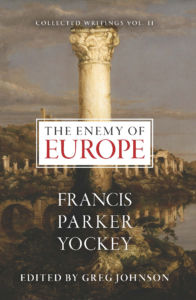


 1,250 words
1,250 words